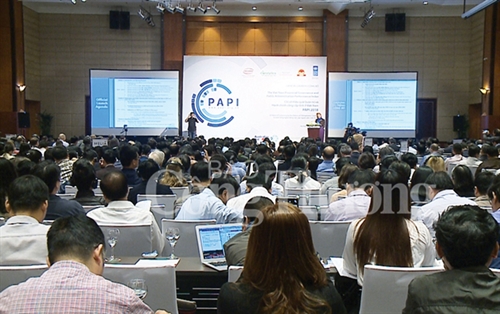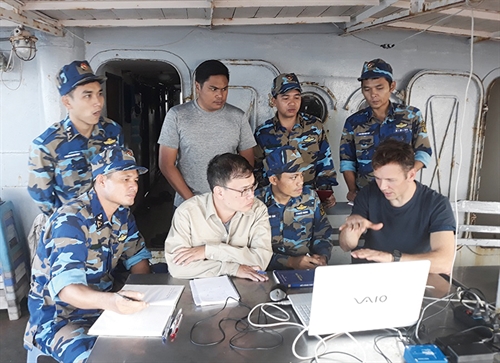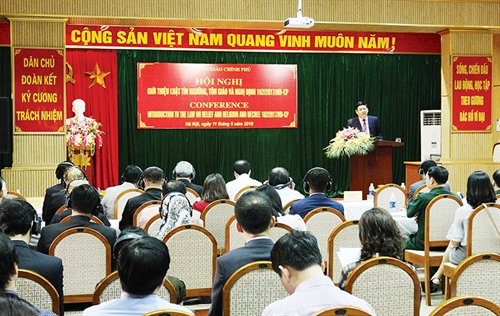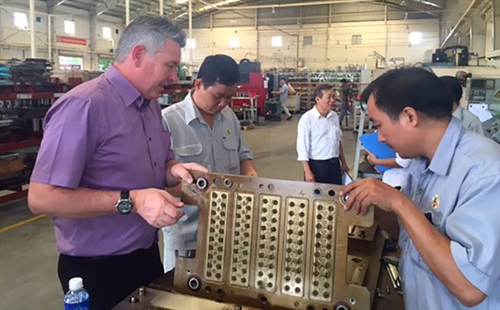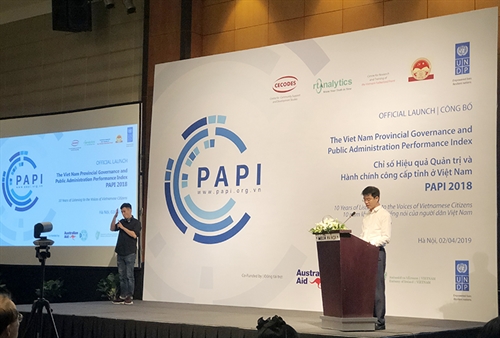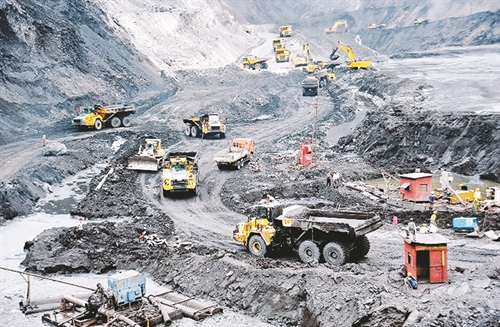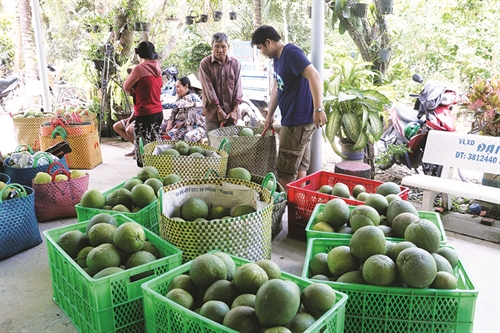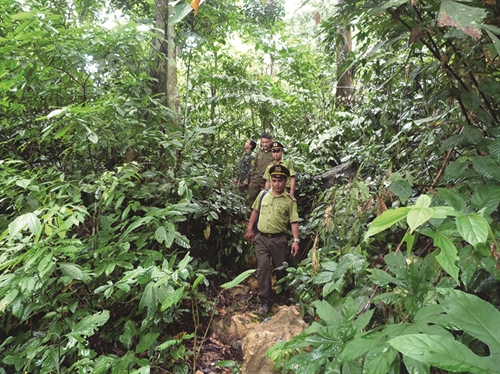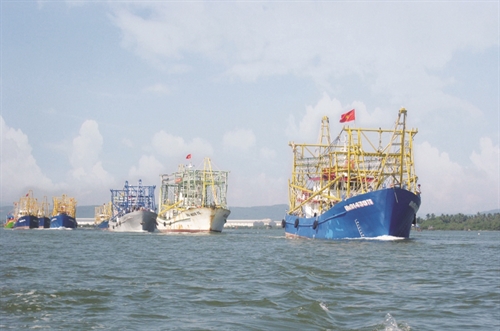The seventh session of the 14th National Assembly (NA) will spend 12 days for lawmaking work with expected passage of seven laws and two resolutions, along with discussion of nine bills, NA Chairwoman Nguyen Thi Kim Ngan said on May 20 at the opening meeting of the session.
To-be-passed laws include two laws concerning architecture, and prevention and control of harms of liquor and beer; three revised laws on education, tax administration, and execution of criminal judgments; the law revising the law on public investment; and the law amending the insurance business and intellectual property laws.
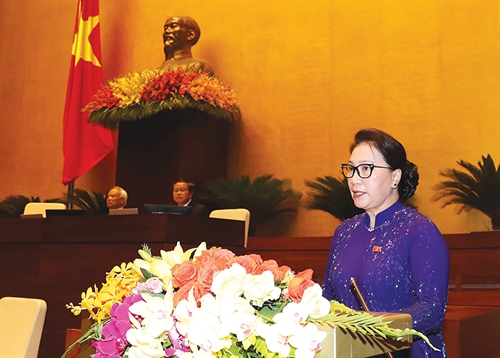 |
| NA Chairwoman Nguyen Thi Kim Ngan gives a speech to open the NA’s 7th session __Photo: Trong Duc/VNA |
At this session, which is scheduled to last until June 14, NA deputies are expected to adopt two resolutions, including one on the 2020 law- and ordinance-making program and changes in the 2019 legislative program, and the other on ratification of Vietnam’s accession to the International Labor Organization’s Convention No. 98 concerning the Application of the Principles of the Right to Organize and to Bargain Collectively.
The legislature will give opinions on the revision of the Labor Code; three drafts laws on library, reserve force, and exit and entry by Vietnamese citizens; and five other bills on amendments to the laws on securities, militia and self-defense force, organization of the Government and organization of local administration, cadres, civil servants and public employees, and state audit.
Addressing the opening ceremony, NA Chairwoman Ngan said 2019 is significant in the push to complete the goals set in the 2016-20 socio-economic development plan. The workload is heavy and requires the political system, Party, citizens and businesses to make every effort and “turn words into action, turn challenges into opportunities,” she said.
Ngan asked legislators to spend time studying documents and give clear opinions during debates, saying that the process would help NA deputies build a consensus about difficult issues, which in turn helps them make better decisions.
According to the session’s agenda, the NA will consider a report on specialized oversight of the implementation of policies and laws on land planning, management and use in urban areas from the effective date of the 2013 Land Law to the end of 2018; and reports on supplementary evaluation of the implementation of socio-economic development plans and state budget in 2018 and the first months of 2019. These reports will be examined along with debates on the use of loans and management of public debts, and handling of violations of the regulations on management and use of state capital and assets at enterprises and on equitization of state enterprises.
Legislators will also consider and decide on the addition of projects to the 2016-20 medium-term public investment plan, and adopt resolutions on the NA’s oversight program and formation of the NA’s specialized oversight delegations in 2020.
The session is scheduled to have two and a half days for questions and answers, focusing on issues selected based on opinions of NA deputies.
Government report
Delivering a report on the socio-economic development plan and state budget in 2018 and the first months of 2019, Deputy Prime Minister Truong Hoa Binh highlighted the Government’s target of ensuring the major balances of the economy.
According to the report, gross domestic product (GDP) growth in the first quarter of this year reached 6.79 percent. The agricultural sector saw an increase of 2.68 percent, with prominent growth in fisheries at 5.1 percent, the highest rate seen in the same period of the previous nine years.
Export turnover in the last four months reached USD 78.8 billion, an increase of 5.8 percent, contributing to a trade surplus of USD 711 million.
Total social investment capital in the first quarter increased by 8.8 percent, in which non-state investment rose sharply.
In the last four months, newly and additionally registered foreign direct investment (FDI) capital reached USD 7.5 billion, up 28.6 percent. The disbursed capital is estimated at USD 5.7 billion, a rise of 7.5 percent.
The report says that more than 43,000 new enterprises were established and over 17,000 businesses resumed operation in the period. Total newly and additionally registered capital reached over VND 1.4 quadrillion (around USD 60 billion). The purchasing managers’ index (PMI) has always been at a high level, belonging to a group of leading countries in the region and the world.
The 2018 figures in the report showed that GDP growth rate was 7.08 percent, the highest rate since 2008, and per-capita GDP reached USD 2,590.
The labor productivity rose 6 percent and the disbursed FDI capital reached USD 19.1 billion, up 9.1 percent.
The total export and import turnover reached over USD 480 billion, in which the export value increased 13.2 percent, and trade surplus was USD 6.8 billion, the largest ever.
Deputy PM Binh, however, pointed out several shortcomings, saying that the macro-economy has not been really stable due to unpredictable prices of crude oil, trade conflicts, and geopolitical tensions in many countries.
The disbursement of public investment capital in many ministries, sectors, and localities remains slow, while equitization of and divestment in state enterprises have not met expectations, he said.
Management of public assets, land and natural resources remained ineffective, he said, adding that growth of some sectors has slowed down.
He affirmed that the Government was determined to consolidate the national macro-economy, ensure major balances of the economy, and promote growth.
The Government will pay greater attention to restructuring the national economy and reforming the growth model along with increasing labor productivity, quality, efficiency and competitiveness.
Attention will also be paid to promoting administrative reforms, inspection, settlement of complaints and denunciations, and the fight against corruption and waste; and to improving the effectiveness of foreign affairs and international integration.
The Government will continue with efforts to improve people’s material and spiritual life, management of natural resources, environmental protection, disaster prevention, and climate change response.
It asked ministries and sectors to review and complete mechanisms, policies and laws to remove obstacles to investment, trade, taxation, labor, land, and resources, according to Binh.
Vu Hong Thanh, Chairman of the NA’s Committee for Economic Affairs in charge of assessing the report, said the Government needed to cut down on administrative procedures, accelerate disbursement of public investment funds, deal with “black credit”, and take measures to control animal epidemics.
The Government needed to continue reviewing commitments in new-generation free trade agreements and treaties; and soon adjust investment attraction policies to lure high-quality FDI inflows, Thanh said.
Voters’ opinions
According to the Vietnam Fatherland Front (VFF)’s report on opinions and petitions submitted to NA deputies by voters nationwide, as many as 3,518 opinions and petitions were submitted after the NA’s sixth session.
The Government and government agencies have settled 2,290 out of 2,293 petitions of voters.
Voters and citizens expressed their confidence in the leadership of the Party and the State, particularly in fighting corruption and waste by imposing penalties on violating officials, both on duty and retired.
However, voters said the rate of recovery of assets derived from corruption remained low, and proposed the Party and Government to take more drastic actions in corruption cases that cause huge losses.
Voters also expressed their concern over accidents caused by drunk driving, punishments imposed on those who cheated on the national exam last year, large-scale transnational drug trafficking, food poisoning in schools, and child sexual harassment.
The VFF proposed that the NA and Government request sectors and localities to accelerate the progress of key national projects, develop transport infrastructure and reduce traffic congestion in big cities and key economic zones.
Other solutions include improving the investment climate and encouraging the development of private businesses and cooperatives to make them a driving force for the economy.
The VFF also proposed the Government and Ministry of Natural Resources and Environment to deal with wastes and call on private investment in waste treatment.- (VLLF)
